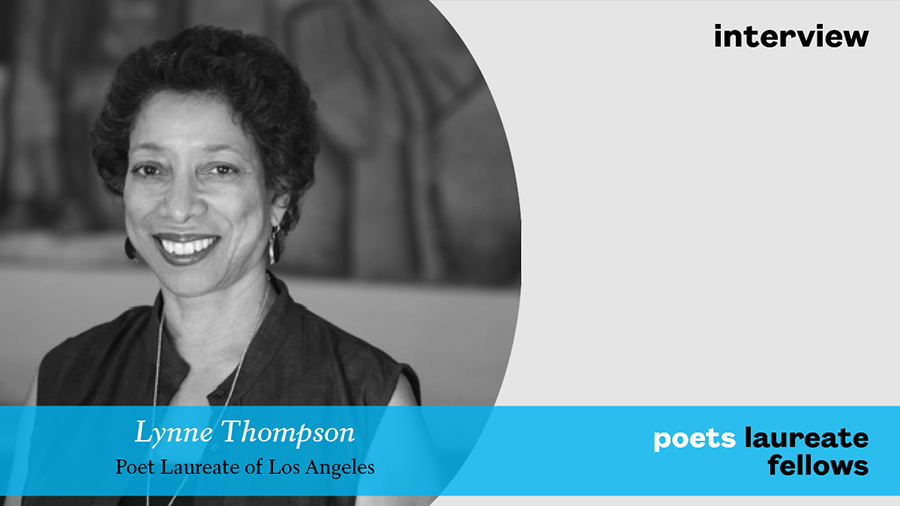
Lynne Thompson is the author of several books, including Fretwork (Marsh Hawk Press, 2019), winner of the Marsh Hawk Press Poetry Prize. A lawyer by training, Thompson sits on the boards of the Los Angeles Review of Books and Cave Canem, and is the chair of the Board of Trustees at Scripps College, her alma mater. In 2022, Thompson received an Academy of American Poets Laureate Fellowship. Thompson will conduct workshops at the Los Angeles Public Library branches and at literary venues across the city that focus on story-telling through poems as a way of codifying Los Angeles’s recent history and its diverse population.
Poets.org: What do you hope for the future of poetry in Los Angeles, and what support do you hope future poets laureate in California have?
Lynne Thompson: The geographical layout of Los Angeles makes it particularly challenging to reach communities where the residents live. My hope for the future of poetry in the city is that its next poet laureate continues to exploit the ways in which technology can enhance the experience of readings and other literary events for all who wish to be a part of the larger literary community. In addition, I hope that all institutions—beyond the city, its schools, and libraries—can see poetry as a valuable tool with which to reach and benefit their constituents.
Poets.org: How has being a poet laureate changed your relationship to your own writing?
LT: Although I don’t believe my relationship to my own writing has changed as a result of the role, what has changed is my understanding of the way in which I am viewed as a poet as well as the way poetry is received. For example, I was invited to read at a church as part of a musical program. An attendee approached me afterward to ask, “What was that you read?” It became clear during our conversation that poetry wasn’t something she was familiar with; however, she was taken with the language she heard and wanted to know more about it. Her innocent inquiry had a great impact, giving me a renewed and heightened sense of responsibility about my writing and how it can impact communities.
Poets.org: How can a poet, or poetry, bring a community together?
LT: One thing I’ve learned as poet laureate is that no one poet can bring a community together, neither the literary community nor the larger one. However, language is the one thing all humans share. When it is inclusive and compassionate, we can all begin to speak to each other with empathy, and the capacity for empathy is one of the best gifts poetry provides to all who hear and read it.
Poets.org: What part of your project were you most excited about?
LT: The first project I undertook as poet laureate was implementing a weekly podcast hosted on the Los Angeles Central Library’s website as well as on Apple podcasts. This was an opportunity to share poems—those from Angelenos and from poets living farther afield—in a convenient and regularized way.
Despite the pandemic, I conducted numerous workshops and gave readings via Zoom for the first year of the appointment. In the second year, there were more opportunities for in-person events that led to a collaboration between numerous branch libraries in Los Angeles . One of those collaborations was a workshop at the Will & Ariel Durant Branch Library, which caters to a segment of the homeless population in Los Angeles. The attendees were elated to participate, which was gratifying. In addition, I was pleased to provide personal and monetary support to various literary organizations, including the Sims Library of Poetry, GetLit, Beyond Baroque, and WriteGirl.
I was also proud to reach out to middle schoolers and invite them to write poems about their city and to publish those poems in a mini-anthology.
A Day of Poetry in LA was arguably the largest and best received event of my term. More than one-hundred poets gathered at the Central Library to take a historic photograph and to read poems to the assembled audience as well as over a livestream.
Poets.org: What obstacles, if any, did you experience when starting your project?
LT: I began my term as Los Angeles poet laureate in January 2021 when the global pandemic was still raging. This meant I had to seek other ways to undertake the role. Enter Zoom. This wasn’t entirely satisfactory, especially as the pandemic seemed never-ending and people got tired of sitting stationary before a computer screen, their faces encased in tiny boxes. Even with the distribution of a vaccine, would-be attendees remained cautious about venturing out into crowds. These circumstances taught me that a poet laureate has to remain as nimble as everyone else when trying to address circumstances that would thwart them from conducting “business as usual.”
Poets.org: Is there a poem on Poets.org that inspires you and your work in Los Angeles, particularly when thinking of storytelling through poems? How so?
LT: This is always a difficult question to answer that is, to pick just one poet or poem. Though I would like to recognize a particularly inspiring poet and his body of work: Kwame Dawes. This multi-tasking poet is the master of lyrical syntax and is unparalleled when writing about place. His poems “The Glory Has Left the Temple” and “A Way of Seeing” are just two examples of his virtuosity. I work regularly to emulate his artistry.
